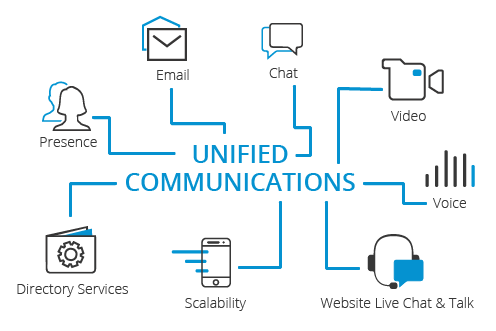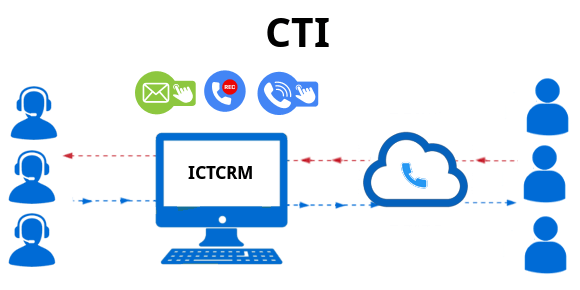In today’s fiercely competitive business environment, it’s imperative for companies to set themselves apart from their rivals. Elevating customer engagement stands out as a critical strategy in pursuit of this objective. Customer engagement revolves around establishing robust connections with customers and ensuring their experiences with the business are consistently positive.
There exists a variety of approaches to enhance customer engagement, and one exceptionally effective method involves harnessing the capabilities of Unified Communication CRM (UC CRM). UC CRM is a software solution that seamlessly integrates unified communications (UC) with the functionalities of customer relationship management (CRM). By consolidating these features into a unified platform, UC CRM equips businesses with a centralized system to proficiently oversee customer interactions, spanning various channels such as phone calls, emails, and chat.
UC CRM offers numerous advantages to enterprises striving to elevate customer engagement. To begin with, it simplifies customer service by facilitating smooth communication and rapid issue resolution. Through the integration of phone, email, and chat within a single platform, UC CRM streamlines communication channels, facilitating efficient and effective customer support.
Additionally, UC CRM enhances sales performance by providing a personalized and streamlined sales process. Through UC CRM, businesses can forge stronger connections with prospective customers, ultimately expediting the closure of deals.
Furthermore, UC CRM contributes to cost reduction by automating several customer engagement tasks. By automating repetitive processes, UC CRM empowers businesses to conserve valuable time and resources.
To sum up, UC CRM emerges as a potent instrument for enterprises committed to enhancing customer engagement and attaining their business goals. If you’re on the lookout for methods to augment customer engagement, UC CRM presents a compelling solution that deserves thorough consideration.
Understanding Unified CRM:
Unified Customer Relationship Management (Unified CRM), often referred to simply as Unified CRM, represents the integration of diverse communication channels and customer data into a unified CRM platform. Its primary aim is to furnish businesses with a unified and all-encompassing perspective of customer interactions, enabling them to deliver personalized experiences and streamline their customer relationship management procedures.
Unified CRM brings together a wide array of communication channels, encompassing voice, email, chat, social media, and more, into a centralized CRM system. This amalgamation ensures consistent and efficient communication with customers across various touchpoints, resulting in a seamlessly integrated customer experience. Interactions and data originating from different channels are systematically captured and managed within the unified platform.
The key elements of Unified CRM are as follows:
Multichannel Communication:
Unified CRM empowers businesses to engage with customers through their preferred communication channels, catering to a wide range of options including voice calls, emails, instant messaging, social media interactions, and more. This flexibility allows customers to select the channel most convenient for them, while businesses ensure a consistent and cohesive response across all available channels.
Customer Data Integration:
Unified CRM integrates customer data from various sources, such as contact information, purchase history, communication logs, support tickets, and social media interactions. This unified customer profile offers a holistic understanding of each customer, enabling businesses to personalize interactions and deliver targeted marketing messages.
Cross-Channel Interaction Tracking:
Unified CRM tracks and records customer interactions across different channels, capturing and storing communication history, customer preferences, and relevant data. By seamlessly connecting customer interactions, agents have access to context-rich conversations, enabling them to provide a more personalized experience.
Workflow Automation:
Unified CRM automates routine tasks and processes, such as data entry, call logging, and follow-up activities. This automation eliminates manual efforts, reduces errors, and enhances overall efficiency. By freeing up time from repetitive tasks, businesses can focus on value-added activities and improve productivity.
In summary, Unified CRM enhances customer service by providing businesses with the ability to interact with customers effectively across various channels. It consolidates customer data, tracks interactions, and automates workflows, leading to improved customer satisfaction, loyalty, and retention.

Benefits of Enhanced Customer Service
There are many benefits to enhancing customer service. Some of the benefits include:
- Increased customer satisfaction: Customers who receive good customer service are more likely to be satisfied with their purchase and to do business with the company again in the future.
- Improved customer loyalty: Customers who are satisfied with their customer service are more likely to become loyal customers who continue to do business with the company over time.
- Reduced customer churn: Customers who are dissatisfied with their customer service are more likely to switch to a competitor.
- Increased sales: Good customer service can help to increase sales by encouraging customers to make repeat purchases and to recommend the company to their friends and colleagues.
- Improved brand reputation: A good reputation for customer service can help to attract new customers and to build a strong brand.
There are many ways to enhance customer service. Some of the most effective ways include:
- Providing prompt and accurate responses: Customers expect businesses to respond to their inquiries promptly and accurately. This can be done by providing 24/7 customer support, or by using a chatbot or other automated system to answer simple questions.
- Being knowledgeable and helpful: Customer service representatives should be knowledgeable about the products or services that the business offers. They should also be able to answer customer questions in a clear and concise way.
- Being friendly and courteous: Customer service representatives should be friendly and courteous to all customers, regardless of their attitude or the nature of their issue.
- Going the extra mile: Sometimes, going the extra mile can make all the difference in a customer’s experience. This could mean offering a refund or replacement for a defective product, or simply taking the time to listen to a customer’s complaint and try to resolve it.

Streamlined Communication and Collaboration:
Effective internal communication and collaboration stand as pivotal factors in achieving business success. Unified Communication CRM (UC CRM) emerges as a catalyst for ensuring the smooth and seamless flow of communication within teams, across departments, and among stakeholders. Through UC CRM, team members gain the ability to engage in real-time communication irrespective of their physical location, harnessing an array of channels that encompass voice, video, and instant messaging. This dynamic facilitates improved collaboration, accelerates decision-making processes, and ultimately elevates overall operational efficiency.
Improved Sales Performance:
The adoption of unified communications CRM is of utmost importance in the quest to optimize sales processes and elevate performance. Sales teams can harness the power of integrated communication channels to engage effectively with prospects, nurture leads, and achieve successful deal closures. By possessing a unified perspective of customer interactions and ready access to historical data, sales representatives can customize their approaches, offer personalized solutions, and, in turn, enhance conversion rates. Furthermore, sales managers gain the ability to monitor sales activities, gauge performance, and provide timely coaching and support to their teams.
Enhanced Productivity and Efficiency:
The integration of unified communications and CRM simplifies and automates various tasks, leading to improved productivity and efficiency. For example, automated call logging and data synchronization eliminate the need for manual data entry, saving valuable time for employees. Seamless integration with other business systems, such as email or project management tools, further streamlines processes and reduces duplication of effort. This enables employees to focus on high-value activities, fostering productivity and driving business growth.
Data-Driven Insights and Decision-Making:
Unified communications CRM generates a wealth of valuable data that can be effectively leveraged for actionable insights and informed decision-making. Through the analysis of customer interactions, sentiment patterns, and historical data, businesses can pinpoint valuable patterns, emerging trends, and customer preferences. These insights play a pivotal role in anticipating customer needs, fine-tuning marketing campaigns, and optimizing overarching business strategies. Furthermore, the availability of real-time analytics and reporting furnishes businesses with current visibility into performance metrics, enabling them to promptly make data-driven decisions.
Seamless Integration and Scalability:
Unified communications CRM can be seamlessly integrated with existing business systems, including CRM software, communication platforms, and other enterprise applications. This integration ensures data consistency, eliminates information silos, and provides a holistic view of customer interactions across multiple channels. Furthermore, unified communications CRM solutions are scalable, allowing businesses to adapt and grow without significant disruptions.
Security and Compliance:
In the contemporary digital landscape, the paramount concerns for businesses revolve around data security and compliance. Unified communications CRM solutions are at the forefront of addressing these concerns by offering robust security measures aimed at safeguarding sensitive customer information and ensuring adherence to regulatory requirements. These solutions incorporate a range of security features, including encryption, authentication protocols, access controls, and secure cloud infrastructure. Moreover, they facilitate compliance with industry standards such as GDPR (General Data Protection Regulation) or CCPA (California Consumer Privacy Act), thereby ensuring that businesses not only meet legal obligations but also uphold customer trust by protecting their data.
Conclusion:
In conclusion, unified CRM is a powerful tool that enhances customer service and drives business success. By integrating various communication channels and consolidating customer data, businesses can deliver personalized interactions, provide seamless omnichannel support, and resolve customer issues more efficiently. Unified CRM empowers customer service representatives with real-time access to customer information, enabling them to deliver exceptional service and quick issue resolution. With workflow automation and self-service capabilities, businesses can streamline processes, improve efficiency, and empower customers to find solutions independently. Furthermore, proactive support becomes possible through the insights derived from data analysis, allowing businesses to anticipate customer needs and address potential issues proactively. Ultimately, unified CRM strengthens the customer service experience, fosters customer loyalty, and contributes to overall business success. By embracing unified CRM, businesses can unlock the full potential of their customer relationships and gain a competitive edge in today’s dynamic market landscape.
Leveraging Open Source in ICT
